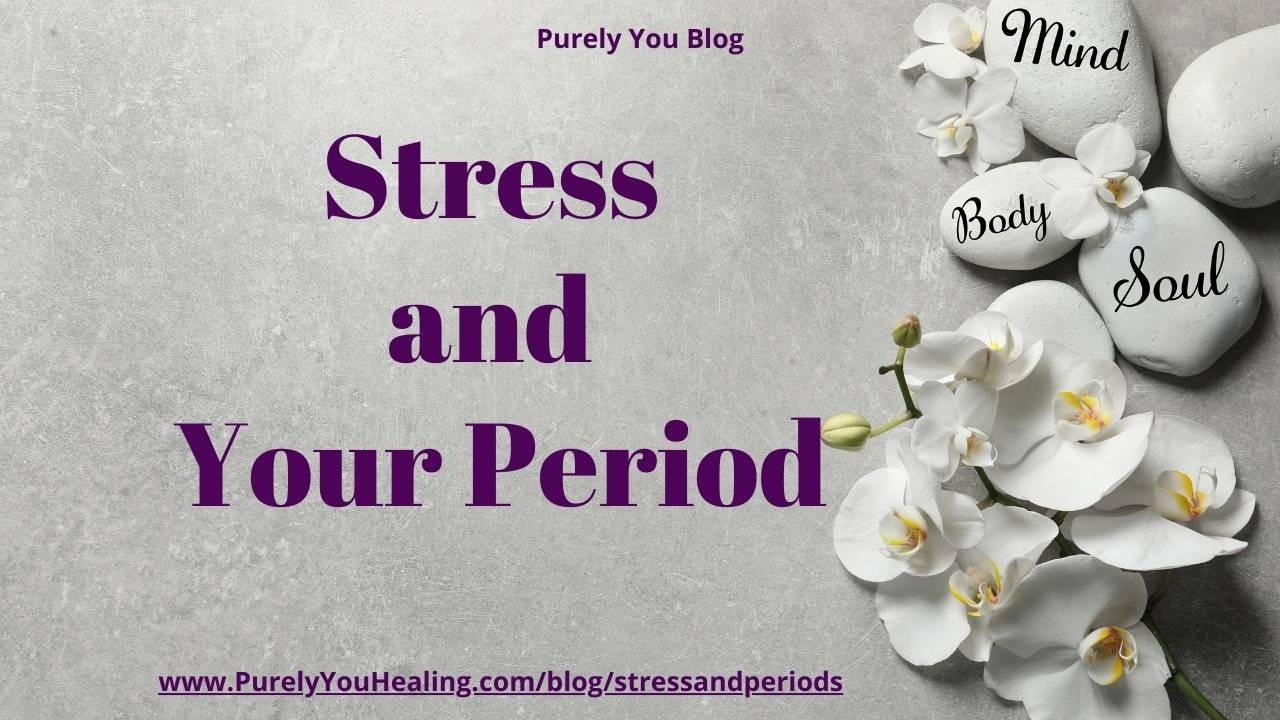Stress and Your Period

Last week we discussed the effects stress has on your body and mind. Things you may not even realize, check it out here. There is one more significant part of your life that is affected by stress too. Your menstrual cycle. We’ve all heard of the fight-or-flight response, right? The driving force behind that response is the hormone cortisol. Higher levels of cortisol in the bloodstream reduce reproductive hormones, especially progesterone and estrogen. That affects your whole entire month! Let’s review your cycle before we get too far into this. Please know that hormone fluctuations in the body are an intricate and complex process. What I will do here is provide information from a very high-level view.
So let’s have a little refresher on your cycle. If you are not on any kind of hormonal birth control, you have four distinct hormonal phases throughout the month. These phases make up what we know to be our menstrual cycle. Of course, everyone is aware of the menstruation part of the cycle; aka your period, time of the month, aunt flow, shark week, etc. But many women are less aware of the other three phases, they often aren’t the focus of the conversation. Here’s the breakdown:
We count day one of your cycle being the first day of full bleeding. You bleed to release the lining of the uterus that had been prepared to host a baby if you had gotten pregnant. For the first 3 days of your period, your progesterone and estrogen are at their lowest.
After your bleeding stops, you move into the follicular phase. Here your estrogen and FSH (Follicular Stimulating Hormone) rise sharply. This is when your body prepares an egg to be released from the ovary.
The release of the ovary is called ovulation and that becomes the start of the third phase. Estrogen and FSH are still climbing and the Luteinizing Hormone (LH) rises as well.
After the egg is released you move into the luteal phase awaiting implantation of a fertilized egg. Now your progesterone and estrogen remain elevated while your FSH and LH decrease. If there is no implantation of an embryo in the lining of the uterus then progesterone and estrogen drop sharply and your period begins, starting the next cycle. This usually takes 26-32 days.
So now let’s talk about stress affecting the cycle. If you have sustained levels of cortisol in your body, your estrogen and progesterone levels are decreased. If they can’t increase, then you don’t see a rise in FSH and LH so ovulation does not happen, or does not happen “on time.” As the luteal phase usually lasts 14 days, if you ovulate 4 days later than usual, your period will start 4 days later than usual too. This can cause what many women describe as irregular periods. In fact, you are not irregular, you are just experiencing another physical symptom of stress!
Of course, these hormones don’t just affect when you start bleeding. This has a role in your libido, your ability to focus and be productive, and even your food cravings! PMS and PCOS symptoms can be heightened too. We could talk forever about how your stress hormones affect every single action in your body. You do not necessarily have to understand all of the intricate workings of the hormone cascades in your body, you just have to appreciate the role stress plays in it.
So often we tell ourselves that the stress we are carrying doesn’t affect us. That we are “tough” “strong” and capable. You are tough. You are strong. And you are indeed capable. However, you are not invincible. If you’ve ever struggled with irregular periods or maybe even started hormonal birth control to help “regulate” them, you may have to look no further than managing your stress to solve your problem.
I’d love to help you understand your body better. Let’s get together soon! Find a spot on my calendar so we can talk about all the ways I can help you.
https://www.inne.io/en/blog/article/stress-menstrual-cycle
https://www.apa.org/topics/stress/body





